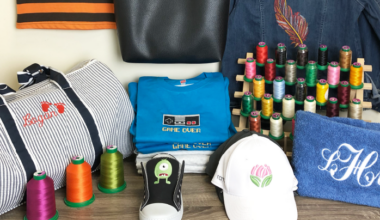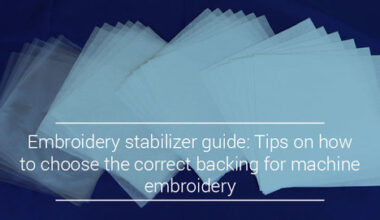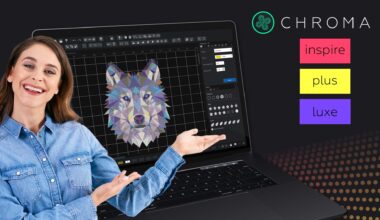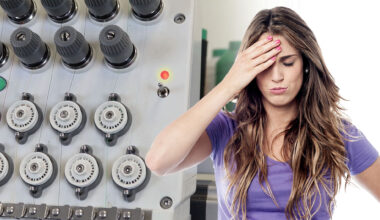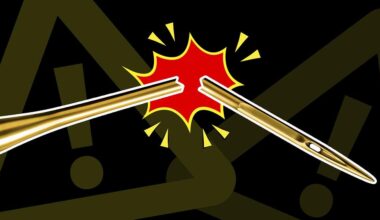Understanding the ins and outs of machine embroidery thread can be your key to creating stunning, professional-looking embroidery projects.
Though it seems like a small detail, using the right machine embroidery thread will create beautiful, intricate designs on fabric using the machine’s automated stitching capabilities. So, let’s hop right into everything to know about using top-notch threads.
What is Machine Embroidery Thread?
Machine embroidery thread is made to withstand the high-speed stitching of embroidery machines. It’s smoother and more robust than regular sewing thread, which helps prevent breakage and ensures your designs look neat and professional. The thread’s purpose is to add color, texture, and detail to your fabric, transforming simple cloth into a work of art.
Compared to regular sewing thread, machine embroidery thread is much stronger and more durable. This strength is essential because embroidery machines work at high speeds and create dense stitching patterns that put a lot of stress on the thread.
It also tends to have a higher sheen, meaning it reflects more light and gives your designs a shiny, eye-catching finish. Regular sewing thread tends to be matte and not as durable, making it unsuitable for embroidery.
Importance of Choosing the Right Thread

Picking the best machine embroidery thread can make a huge difference in the quality and longevity of your embroidery work.
Choosing the right embroidery machine thread for your projects is crucial for achieving the best results. The quality of the thread you use can significantly impact the final look of your embroidery, affecting both color vibrancy and durability. High-quality threads ensure that your designs remain bright and beautiful, even after multiple washes.
Using the wrong thread can lead to various problems like breakage, puckering, or fading, which can ruin your hard work and make your project look less professional.
Types of Machine Embroidery Threads
Polyester Thread
Polyester thread is known for its strength and colorfastness, meaning it retains its color even after many washes. It’s a great option for garments and items that need to endure frequent laundering. Its sheen also adds a beautiful, shiny finish to the designs, making them stand out more.
Polyester thread is resistance to shrinking and stretching, which ensures that your embroidery remains in place and doesn’t distort over time. This makes it great for kids’ clothes, kitchen towels, and other frequently used fabrics.
Rayon Thread
Rayon thread is known for its lustrous finish, making it an excellent choice for decorative stitching. This thread has a shiny, silky appearance that catches the light beautifully, adding a touch of elegance and sophistication to any embroidery project. Its relative softness and smoothness compared to other threads make it gentle on fabric, reducing the risk of damage during stitching.
However, rayon thread is sensitive to high heat and moisture. It can lose its strength and shape when exposed to these elements, which is why it’s best used on items that are not frequently laundered. Rayon thread is great for projects like wall hangings, decorative pillows, or framed art, allowing its beauty to shine without the stress of regular washing.
Cotton Thread
Cotton is the best thread for machine embroidery for its natural matte finish, which provides a more traditional and classic look to embroidery projects. This thread does not have the shiny sheen of polyester or rayon, but its subtle, muted appearance can be perfect for certain designs, especially those aiming for a vintage or rustic feel.
One of the key benefits of cotton thread is its strength. It is less likely to create friction or heat during embroidery, making it a reliable choice for various projects. Cotton thread is ideal for use on natural fabrics like cotton and linen.
These combinations ensure a harmonious texture and durability, perfect for creating timeless pieces like quilts, table linens, and clothing.
Metallic Thread

Metallic thread brings an eye-catching shimmer and shine to designs, making it a popular choice for adding highlights and special effects to embroidery projects. Its glittery finish can make designs stand out, giving them a festive or luxurious touch.
However, using metallic thread comes with its challenges. It tends to break or fray more easily than other types of thread, requiring careful handling and specific techniques to avoid frustration. To work with metallic thread effectively, consider using slower stitching speeds and specialized needles designed for metallic threads.
These needles have larger eyes and smoother surfaces to reduce friction and stress on the thread, helping you achieve stunning results with less hassle.
Specialty Threads for Machine Embroidery

Variegated Thread
Variegated thread is a unique type of embroidery thread that changes color along its length. Unlike standard threads, which maintain a consistent color, variegated thread features multiple hues blended together, creating a colorful gradient effect. This can add depth and interest to your embroidery designs, making them stand out with a dynamic and vibrant appearance.
This can be used to simulate natural textures like grass, water, or foliage, giving a more realistic look to landscapes and nature-themed projects. It’s also excellent for adding a whimsical touch to decorative pieces, such as borders or monograms, where the changing colors can create a playful and eye-catching effect.
Water-Soluble Thread
Water-soluble thread is a special type of thread designed for temporary stitching and basting. Its primary purpose is to hold fabric pieces together temporarily, making it easier to manage intricate designs or layers without permanent stitches. This thread is particularly useful in projects where precision is critical, such as applique and quilting.
One of the remarkable properties of water-soluble thread is that it completely dissolves in water, leaving no residue behind! When the project is complete, and the temporary stitches are no longer needed, you can simply wash the item, and the thread will dissolve, eliminating the need to pick out basting stitches manually.
Water-soluble threads allow you to baste complex layers or delicate pieces securely without worrying about removing the stitches later. This ensures that your design stays in place precisely as intended, leading to a cleaner and more professional finish.
Thread Weight and Size

Understanding Thread Weight
Thread weight refers to the thickness of the thread and significantly affects the appearance of the embroidery. It is usually measured in numbers, where the lower the number, the thicker the thread. For example, a 40 wt (weight) thread is thicker than a 60 wt thread.
Common weight measurements, such as 40 wt and 60 wt, are used for different applications. A 40 wt thread is commonly used for general embroidery purposes because it provides good coverage and is suitable for most fabrics. In contrast, a 60 wt thread is finer and is often used for detailed work or when a more delicate, subtle finish is desired.
Selecting the appropriate thread weight for your project involves considering the fabric type and the desired effect. For heavy fabrics or when you want your embroidery to stand out, a thicker thread like 40 wt is ideal. For lighter fabrics or intricate designs, a finer thread like 60 wt will provide a cleaner, more precise look without overwhelming the fabric.
Thread Size Considerations
Thread size can significantly impact the detail and texture of your embroidery projects.
Thicker threads (which have lower weight numbers) create bold, prominent stitches that stand out, adding texture and dimension to your designs.
Conversely, finer threads, with higher weight numbers, produce delicate, intricate stitches that are perfect for detailed work and fine lines.
Thicker threads require larger needle sizes to pass smoothly through the fabric without causing damage. Thinner threads work well with smaller needles, allowing for more precise stitching on delicate fabrics. Using the wrong combination can lead to issues like thread breakage, uneven stitches, and fabric puckering.
Different thread sizes can also be used creatively to achieve specific design effects. Using a thick thread for outlining and a thinner thread for filling in details can create a striking contrast that enhances the overall design.
Tips for Working with Machine Embroidery Thread

Proper Thread Tension
Setting the correct thread tension is essential for smooth stitching. Proper tension ensures that the top and bobbin threads interlock correctly, producing even stitches without loops or puckering.
To adjust the tension, thread your embroidery thread machine correctly and use a balanced tension setting. Test the tension on a scrap piece of fabric that matches your project material. Adjust the tension dial in small increments until the stitches appear balanced on both sides of the fabric. If the top thread is too tight or loose, it can affect the stitch quality and the overall look of your embroidery.
Troubleshooting common tension-related issues involves checking the thread path for any obstructions, ensuring the bobbin is wound evenly, and rethreading the sewing machine embroidery thread if necessary.
Thread Storage and Maintenance
Store threads in a cool, dry place, and keep them organized by color or type using clear storage boxes or thread racks. Keeping threads away from direct sunlight is important to prevent color fading, which can affect the appearance of your projects over time.
Experimentation and Practice
Don’t be afraid to mix and match colors to see how they interact and bring your designs to life. Starting with small projects is a great way to build confidence in handling different threads. These smaller pieces allow you to practice and refine your techniques without the pressure of committing to a large, complex project.
You can focus on mastering the use of different thread types, learning how they behave and how best to utilize them in your designs.
Ricoma: Your Go-To Guide On All Things Embroidery!
At Ricoma, we make sure you have everything you need for your embroidery projects. Whether you’re just starting or have been embroidering for years, you can compare our embroidery machines to find the perfect fit.
Our SWIFT embroidery machine is perfect for fast and easy stitching. Plus, with our Chroma digitizing software, you can create amazing designs with ease!


